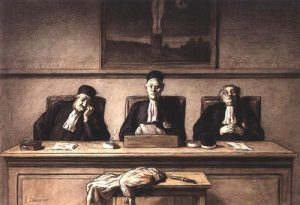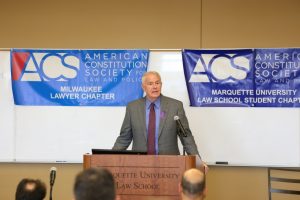More Doubts About the Court’s Resolution of the John Doe Investigation
Today, the United States Supreme Court summarily affirmed the decision of a Three Judge Panel of the U.S. District Court for the District of Columbia in Independence Institute v. Federal Election Commission. By affirming the panel in this case, the U.S. Supreme Court seriously undermined the legal rationale that the Wisconsin Supreme Court relied upon when it dismissed the John Doe investigation into possible illegal campaign coordination during the Governor Walker Recall Election. In one sense, today’s action by the U.S. Supreme Court merely establishes the narrow rule that “electioneering activity,” which encompasses a variety of activity beyond express advocacy on behalf of a candidate for office, is subject to regulation without violating the U.S. Constitution.
However, the action of the U.S. Supreme Court is significant because it also necessarily rejects a converse proposition: that the scope of permissible government regulation of election activity is limited to conduct which constitutes “express advocacy.” The Independence Institute case is relevant to the John Doe Investigation because both cases raise the legal question of whether the U.S. Constitution permits any regulation of election activity other than “express advocacy” or its functional equivalent. “Express advocacy” is usually defined as a communication that expressly advocates for the election or defeat of a clearly identified candidate.
The Independence Institute is a nonprofit organization. It challenged disclosure requirements contained in the McCain-Feingold Act which would have required it to disclose its donors if it spent more than $10,000 on “electioneering communications” in the 60 days before a general election (or the 30 days before a primary election). The group argued that this statutory requirement was unconstitutional because it went beyond the regulation of express advocacy. As described by Judge Wilkins in an earlier proceeding in the D.C. Circuit, the argument of the Independence Institute reduced to the argument that “the only speech that should be considered an electioneering communication, and therefore trigger the BCRA’s reporting and disclosure requirements, is speech that is ‘unambiguously related’ to a campaign.” The group wanted the Court to rule that the disclosure requirement in the statute could only be enforced in instances involving express advocacy.
If this sounds familiar, it is because the legal argument advanced by the Independence Institute is parallel to the reasoning adopted by the Wisconsin Supreme Court in its opinion ending the John Doe Investigation (State ex rel. Two Unnamed Petitioners v. Peterson, 2015 WI 85).


